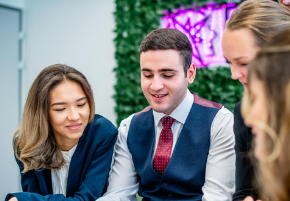- About
- Programs
- Innovation & Research
- Campus Life
- Career Services
- Admissions
- News & Events
- Alumni
Intelligence Unlocked: 3 Effective Ways to Become Smart
3 ways to grow your intelligence and reach your full potential
Every student has their own unique strengths and it is the duty of the educational institute and its educators to discover and harness these strengths so that students can reach their full potential. So, what exactly is intelligence and how can it be maximized to ensure that students flourish and learn?
Seven years ago, I started teaching in the French Alps and on my very first day, Adele, aged 12, asked me, ‘Do you think I can do this? Am I smart enough to understand this?’ I distinctly remember her lack of confidence and doubts about a simple grammar exercise. I told her that she was as bright as a star and that she would master the exercise with a bit of practice. Adele’s questioning of her intelligence echoes a painful truth everyone faces: ‘Am I smart enough?’ The real question though is: ‘How smart am I?’.
The topic of learning and intelligence is fascinating, and one I have spent much time researching. For the past five years, I have been working as a learning strategy consultant, helping over 3000 learners grow and master their most powerful tool: their brains. Every student has their own unique strengths and it is the duty of the educational institute and its educators to discover and harness these strengths so that students can reach their full potential.
So, what exactly is intelligence and how can it be maximized to ensure that students flourish and learn?
1. Harness the Power of Plasticity
Is it possible to become smarter or is intelligence granted from the start? The more researchers study intelligence, the more difficult it is to define it. However, neuroscientists seem to agree that intelligence is related to a person’s ability to adapt to their environment. With the current pandemic, this definition shines an interesting light on what being smart means.
The brain is a mesmerizing organ, it has the ability to change and adapt within a second to the external world. This is called brain plasticity, and basically, this is the reason that you and I are alive right now. This plasticity enables the brain to modify its connection and to re-wire itself in other words, its plasticity makes you develop your skills. Every time you try something new, your brain is creating new connections, thus enhancing your ability to learn. For example, try brushing your teeth alternatively with your right and left hands as a daily brain plasticity activity.
2. Identify Intelligence Strengths
When we mention intelligence, many of us might think of an IQ score. However, this is a dated understanding of intelligence, as the tests only offer a limited assessment of what a brain can do.
Howard Gardner is a developmental psychologist and Hobbs Research Professor of Cognition and Education at the Harvard Graduate School of Education. In his trailblazing 1983 book, Frames of Mind: The Theory of Multiple Intelligences, Gardner revolutionized the worlds of education and psychology by suggesting that all people have a combination of different kinds of ‘intelligences’ that can be developed and shaped.
My multiple intelligences theory is a critique of the standard psychological view of intellect: that there is a single intelligence, adequately measured by IQ or short answer tests,” explains Gardner. “IQ tests assess linguistic and logical-mathematical intelligence and sometimes spatial intelligence. But humans have several other significant intellectual capacities...
Gardner’s eight intelligences are: linguistic and logical-mathematical (the styles of thinking measured most often on psychological tests), musical, spatial, bodily-kinesthetic (including large and small motor skills), interpersonal (an area of strength for teachers, social workers, and politicians), intrapersonal (self-knowledge) and naturalistic.
Gardner uses the metaphor of a computer to explain his theory: “In comparing multiple intelligences to a traditional psychological view of intelligence, one might find it useful to think of them analogously as if they were computers. Belief in a single intelligence implies that humans possess a single general-purpose computer, which can perform well (high IQ), average (normal IQ), or poorly (low IQ). Belief in a multiple intelligence theory implies that human beings possess several relatively independent computers where strength in one computer does not predict strength (or weakness) in the other computers. Put concretely, one might have a high (or low) spatial intelligence, but that does not predict whether one will have a high (or low) musical or interpersonal intelligence.”
3. Evaluate and Grow
Now, look at yourself and at what you have achieved and start mapping your own talents. It is also interesting to look at your family, friends, and colleagues, do they have the same strengths as you? Or not? Gardner’s theory is a good tool to use when discussing and assigning tasks to your students, colleagues, and peers. It helps to give you an overview of the strengths and gaps within a group.
Each of us has a unique combination of intelligences that we can grow with focus and dedication...
I personally scored very poorly when it came to musical-rhythmic intelligence. However, with application and practice, I now manage to get the rhythm of the song. And if you look at your own mapping of intelligences, you might find skills you want to develop further. The plasticity of your brain combined with learning and motivation makes it possible.
So, are you smart enough? You definitely are, and neuroscience has proved it! It is high time we all take ownership of our brains by understanding our strengths and evaluating the steps we can take to grow our minds and to avoid having a fixed, and narrow mindset. So, brains up, the world is waiting for you to unleash your potential!
By Delphine Blin-Genin, Lecturer at César Ritz Colleges Switzerland
#Academics
















